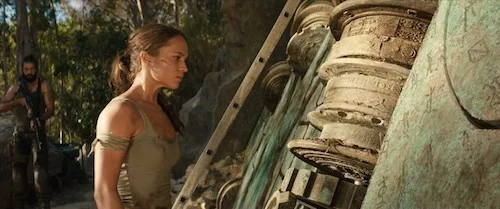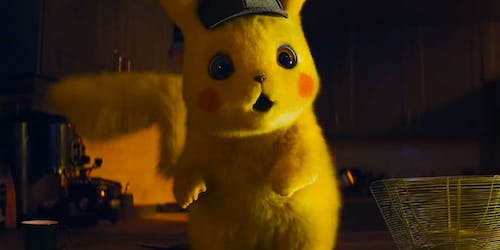Can Video Game Films Be Solvable?
The newest promotional image for Sonic The Hedgehog.
Most of us have seen that computer generated desecration known as Sonic. It has happened. It's too late. We are too deep into this, and production certainly isn't slowing down. I wont speak on behalf of Sonic the Hedgehog, the new live action adaptation of the classic Sega video game directed by first timer Jeff Fowler (I personally grew up on Sonic 3 & Knuckles myself). I will, however, maybe comment on why so many video game adaptations do not work out at all.
My first point has already passed by subliminally. You see that I made a personal connection to Sonic the Hedgehog? That is a major problem already with many films based on video games: you yourself have already made your own attachment to these games. Popular games can get turned into films or series; they wouldn't be adapted if these games weren't a hit. Chances are people have invested hours into these games. They know the story of John Marston inside and out. Mario is an even easier example. We get the character's tale. We have our own experience with him trying to save Princess Peach (or Daisy). Why would someone else's vision ever even match up to these high expectations? We're involving fandoms which already have issues with casting decisions, reinterpretations and story lines.
I brought up John Marston of Red Dead Redemption fame, because that game (along with many others) allow for the second problem with these cinematic takes: their open-worldliness. You take the main story at your own time and pace. Or you can virtually create your own new story (limited to what game developers allow you to do, of course). It is up to you if Link develops a longing for rupee hunting in the tall grasses of Hyrule, or if he is a go-getter that runs on empty financially. Hell, Link can spend an hour trying to fish instead of saving a kingdom stuck in a generated limbo (thanks to your procrastinations).
Video games aren't exactly limitless, but they are exceptionally close. In Red Dead Redemption 2, you do pretty much everything, down to feed the horse you ride and skin the animals you eat. A cinematic limitation just will not suffice any more. This is without even mentioning the fact that games themselves are becoming more cinematic. Redemption (both of them, or all three if you include Red Dead Revolver) are so heavily based on a variety of films (mostly spaghetti westerns, naturally), that Easter eggs and tropes are littered everywhere (the city of Plainview being full of oil rigs is my personal favourite). Escaping the trivialities, the actual music, lighting, and (gasp) story telling greatly exceed the simplicities of older video games (thanks to expanding technologies, of course).
On the topic of older games, the other problem arises: how much could you do with so little? Remember the excruciating Super Mario Bros. feature film? The one where Dennis Hopper was a dinosaur-human hybrid, goombas turned into creepy security bouncers, and pizza jokes were a scream? With little material to work with, this is a blessing for players back in the day. You get right into the action. You create your own fate. You try again and again until your own personal victory was accomplished. With someone else at the helm, there is no way everyone will be on board, especially when you are creating an actual cinematic take on these games that are stuffed with liberties.
Mario and Luigi Mario in Super Mario Bros.
Older games are too basic. Newer games are too set in stone. Both are enhanced by your own memories and experiences. Sonic could have looked way better and still have been a problem to some, because the adventures you yourself have experienced could likely never be matched. This is why even story-driven epics like Tomb Raider and Assassin's Creed underwhelmed. These depictions may have meant a whole lot to the filmmakers behind them, but you played these games differently (even slightly) and do not share the same viewpoints.
If you like these films, you might find yourself in the minority. Virtually every single video game film has suffered critically, whether it be marginally or brutally. The only exception I myself can think of is the Castlevania Netflix series (perhaps because a series allows for breathing room, or because of all of the video game or manga expansions of the franchise). If you like the odd film of this kind, that could very well be because you may have had a similar playing experience. If you haven't played these games at all and like any of these films, that can obviously be attributed to you not having forged your own path. This is entirely possible, especially given the fact that these are films and not the actual games.
Should we be separating the films from the source materials, on that note? I absolutely think it is imperative to always judge a film based on its own merits. However, like a reported series of fungal infections that spread and carry similar patterns, a search for where it all went wrong does make sense. Other mediums get adapted all the time, and they do not suffer quite a gruesome fate. It is important to recognize video games as the younger medium that it is, and understand that something may not be working as it should. Again, if any of the films mentioned have been ones you like, that is great. Yet, a diamond in the rough does not solve a common problem that exists overall.
Why aren't novels experiencing the same issues? It isn't just because books have been around since even well before cinema has. It likely has to do with the idea that books -- while open to interpretation on such a large scale -- have a different kind of personal connection. You imagine all of the words in your own way, from scratch. Video games, however, offer you enough visuals and sounds to piece together a general idea of how your experience will go. Books allow for more personal creativity, and their adaptations still receive backlash ("Well, I wouldn't have done this part that way!"). With video games, it's almost like so many empty spaces are already filled, all that is left is what you decide. When that gets taken away, it all crumbles.
Lara Croft in the Tomb Raider reboot.
Even if you don't play these games, you might not like these films. This is because the games are made the way they are, and the filmmaker's approach might still misinterpret how to work with the little leg room offered. Something about video game films just sets up each and every subsequent entry for a collapse.
May I propose this is because these reinterpretations are working too much on too little, and too little on too much? Can we truly cram a forty hour game into a two hour film? Must we attempt to bring out so much complexity out of a character that served as a memorable side quest option, of whom is only included for referential reasons? A right balance has to be made. Tomb Raider mostly got this tightrope right, yet it fell into the conventional action film bin right afterwards (so close, and yet so far). Let’s also remember that this was not Lara Croft’s first hunt, as the Angelina Jolie films of yesteryear also exist (in an even worse capacity). The point is, even this decent attempt took much refining of an already failed previous attempt (or two).
We currently have two contenders to finally usher a new dawning for video game films. The first is Sonic the Hedgehog, which is already receiving so much negative feedback. The titular azure rodent has faced a lot of hardship already, yet he has pulled through console collapses, video game busts, and mascot competition thanks to the loyal fan base. We even had a decent Saturday morning cartoon based on him and his woodland friends with Sonic the Hedgehog (crowned Sonic SatAM by fans). Every week, for too short of a run (two seasons), an actual story was developed. You can also include the insane Adventures of Sonic the Hedgehog and Sonic Underground, but we can dismiss those. There was also the widely popular comic series, created by Archie Comics, that went on for decades (until 2016). We’ve seen Sonic succeed in other ways. As ugly as the first promotional images are, are we judging Sonic too quickly?
A promotional image for Detective Pikachu.
There is also Detective Pikachu, the upcoming first live action Pokémon film ever made. Based on the popular video game (and, of course, the franchise), this comedic noir tends to be influenced heavily by a similar mixture of mature and youthful (Who Framed Roger Rabbit, anyone?). The reception here has been a bit warmer (besides the campaign for Danny DeVito to voice the electric mouse failing, of course). As great (or passable) as everything may seem, are we pleased with too little already?
At the end of the day, people have mocked Sonic and applauded Detective Pikachu for the exact same reasons. We just want a video game film adaptation to finally work. In fact, it can't just work; we need one to work well for once. Assassin's Creed seemed like the film to do the impossible. Then it was Tomb Raider. We are here now, and the mission is still not accomplished. Perhaps we are expecting way too much, but it is so difficult not to when the source material is a literal extension of you. Your button presses become the movements of a second life. We want Pikachu to succeed, because far too many films before have not. We make fun of Sonic, because we dread yet another let down ahead.
I guess cinema will have to take the video game route and just keep trying. Each failure is a new 1-up or a re-spawning at a check point. But we have to finally reach the flag, defeat the final boss, or at least face the elite four. Films being made to profit on wide audiences as a business strategy is not enough anymore. The right balance to make a video game adaptation moderate can be done (and a Gameshark is not required). Let's hope these two upcoming attempts work out better.
Andreas Babiolakis has a Masters degree in Film and Photography Preservation and Collections management from Ryerson University, as well as a Bachelors degree in Cinema Studies from York University. His favourite times of year are the Criterion Collection flash sales and the annual Toronto International Film Festival.





